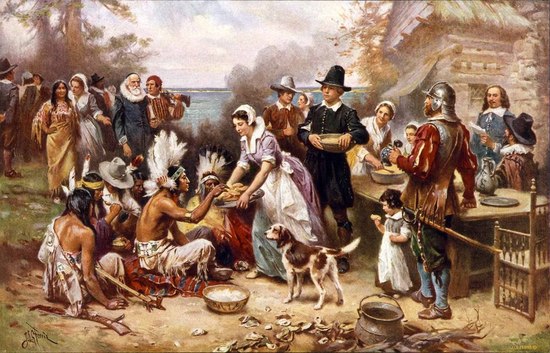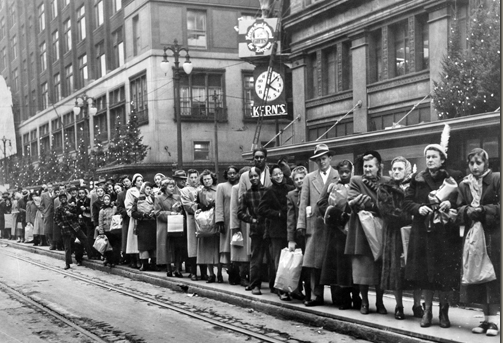
I want to encourage you to understand and embrace the importance of holiday traditions. Tradition is remarkably important, especially for children. Some people may scoff or roll their eyes at traditional activities — teens and college kids especially — but I would say that view is shallow and should be disregarded as naïveté. Some traditions may seem silly, and in fact some may be legitimately silly, but to focus on their “silliness” is to miss the whole point of doing the activity.
What Are Traditions?
Simply put, traditions are activities or rituals that are done routinely and for a long enough time that they become a set norm. Without ritual, holidays lose their meaning. Not “ritualistic” like a coven killing small animals on midsummer nights eve — just anything simple or complex, that becomes part of a pattern. Fireworks on Independence Day, turkey on Thanksgiving, stockings at Christmas, to name a few common ones.
A Family Is More Than Your Genes
When I was a young girl I had neighbor, a sweet old lady named Margaret, who was born before the Great Depression. She was abandoned by her biological family when she was very young — this was common during the Depression because parents simply could not support their children. She had no memories of her biological family, but was raised by adoptive parents. All of the customs and traditions that she knew came from her adoptive family; her sense of connectedness and belonging, the very essence of what made Margaret a part of her new family, came from the activities they did together. A family is a social group, not a shared gene pool.

Like the grooves worn into Roman stone roads, traditions endure for generations. Margaret inherited her genes from her biological parents, but her traditions came from her adoptive ones, and that is what she passed on to her children. Family traditions are a social link to those who came before you. Some traditions, especially religious ones, have been practiced the same way for thousands of years. When you engage in those activities, you acknowledge and connect to those people who are with you today, those who have come before you — it’s truly a link to the past.
Embrace Tradition
Activities that are done together as a familial group, especially on holidays, become ingrained in the minds of children (and adults too) and create a sense of enduring solidarity. Even angst-filled teenagers, with more sense of independence than wits, will look back fondly at family traditions when they are mature enough to appreciate them.
All cultures develop their own traditions over time, evolving much like genes, incorporating new traits from outside influences or generating newly from whole cloth. Most holiday traditions in North America have roots in Europe, but many developed newly right here. Trick-or-treating has its origins in Ireland, but America took that custom and made it an entirely new thing. Mailing Christmas cards, wrapping gifts in colorful paper, and eating cranberry sauce at holiday feasts, are a few traditions that were invented right here in America. So too can individual families evolve or even develop their own holiday traditions.
Don’t Miss the Forest for the Trees
Perhaps you’ve gotten away from traditional activities; try thinking back to when you were young and ask yourself what things you used to do on certain special occasions. Maybe every News Years Eve your family used to get Chinese food, or perhaps there’s a religious observance that you used to practice when you were young. I must emphasize that participating in religious traditions do not require that you have faith or belief in them. The purpose here is to embrace and connect with family, past and present. An atheist or agnostic can joyfully sing Christmas carols without having to extol the Christ Child and without sarcastically chiding his relations that Jesus most likely was not born on December 25.
My family has a Scottish tradition on New Years Day called “First-Foot“, where the first person to enter your home on the new year must be bearing gifts of bread, salt, and whiskey. It’s for good luck. We are not superstitious, we don’t believe in luck, but its fun! It’s been done by my family for a thousand years or more. We gather up some bread, salt, and scotch, and go visit relatives on New Years morning. We gain far more benefit from practicing this ancient (and somewhat silly) tradition than from any insignificantly minor offense from my lack of sincere belief in the custom. As the old saw goes, “Don’t miss the forest for the trees.”
Traditions New and Old
Twenty-five years ago my husband began running in a local Thanksgiving Day 5K “fun run”. When I married him, this was entirely new to me, but now I’ve embraced it. We wake up at 5:30am on Thanksgiving morning, drive to the next town over, and run a 5K race at dawn in the freezing cold air with thousands of strangers. It sounds like lunacy, but I love it. When the kids were younger I pushed them in a stroller, now they run along with us. Its become a tradition.
We’re all familiar with traditional holiday foods, like turkey and pumpkin pie, but my family has a traditional holiday dish from Scotland called bread sauce which we always eat with turkey, and now my husband and my kids know it as tradition too. Embrace older traditional dishes and incorporate new ones too.
Here is a list of traditions, old and new, to consider for the major holidays.
Easter: color eggs with the kids; hide the eggs for the kids to find; leave a basket of candies or chocolate bunny by their bed overnight from the Easter Bunny; buy an Easter lily for your home; have a family Easter feast.
Independence Day: Barbecue; party games; do a July 4th ritual; fireworks (safely)
Halloween: make or buy a costume; visit a pumpkin patch; carve jack-o-lanterns; host a Halloween party; trick-or-treating; watch Halloween specials.
Thanksgiving: run in a local race; watch Macy’s Parade; watch football; read aloud William Bradford’s original Thanksgiving Day prayer or George Washington’s Thanksgiving Day proclamation; family feast; watch the first Christmas special of the year after dinner.
Christmas: Advent calendar starting Dec 1; send Christmas cards to friends and relatives; pictures with Santa; decorate Christmas tree; decorate the outside of your house; sing Christmas carols; bake cookies and fruitcakes; hang mistletoe; Christmas Eve service at a local church; read “The Night Before Christmas” before bed on Christmas Eve; stocking hung up on Christmas Eve; leave cookies and milk for Santa; Santa always leaves a tangerine in the stockings; prepare a special Christmas breakfast; Christmas crackers at the feast; make wassail. Here is also a list of family Christmas outings to do throughout December.
New Years Eve/Day: go out to dinner; stay up until midnight; shoot fireworks at midnight; first-foot; resolutions; watch Rose Parade on TV; polar bear swim (jump into a frozen body of water); family feast.
If you haven’t already given it thought, I would urge you to consider without prejudice what traditions you want to adopt, practice, and pass along to your kids. Disregard the insignificant social stigma this may elicit from your peers or associates for participating in “old-fashioned” or “archaic” rituals. Your family will be better off if you start now, and your children will appreciate it.

